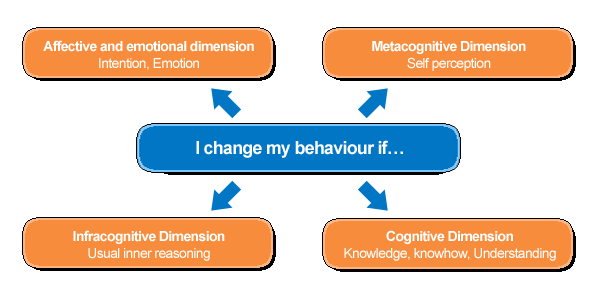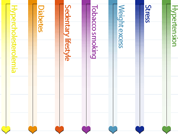- Therapeutic adhesion or compliance
- Therapeutic education: an effective approach to chronic disease
- A new paradigm for the health care provider
- Multidisciplinary health care providers
Therapeutic adhesion or compliance
In order to improve therapeutic adhesion of patients with coronary heart disease, it is crucial to use tools developed for the treatment of chronic disease. Therapeutic education and the spirit of motivational interviews are such tools. Moreover, informational tools must perform well and be used appropriately to enhance their impact on the patient.
Therapeutic adhesion is determined by the quality of communication and information regarding the disease and its treatment.
The objective of communication is to transmit a message from a teacher (in this case a health care provider) to reach a therapeutic goal. In order for this to be effective, the communication tools have to take into account two parameters: the teaching ability of the health care provider and the learning ability of the patient. These two parameters depend on a patient’s emotional, cognitive and interpersonal factors, all of which have to be taken into account.

The ultimate goal is to have the patient convince themselves to actively manage their disease and to place themselves at the centre of the treatment process. This ensures optimal therapeutic adhesion and therefore diminishes the risk of recurrence of cardiovascular events.
Therapeutic education: an effective approach to chronic disease
The chronic nature of disease puts the time dimension at the center of the medical management of patients. Beyond primary and secondary prevention, therapeutic education (TE) enriches the role of the health care provider as it provides an opportunity to be a partner in the creation of a therapeutic project which takes into account imperatives of the disease and the patient's life plan.
“Therapeutic education must enable patients to acquire and maintain skills that allow them to manage their treatment in an optimal manner in order to achieve a balance between their life and their disease. It is a continuous process that is an integral part of medical care. (…) TE is designed to help patients and their families understand their disease and treatment, to cooperate with health care providers, to live a healthy life and to increase their quality of life.” (OMS, 1988)
TE's usefulness in managing chronic disease has been demonstrated in various pathologies (diabetes, asthma, heart failure, obesity, HIV), most notably by improving adhesion to treatment, decreasing complications, and increasing quality of life. In the area of coronary heart disease, a recent large meta-analysis confirmed the effectiveness of secondary prevention programmes in decreasing mortality and recurrence of myocardial infarctions.
Other work has shown that paying attention to patients’ representations and perceptions of their disease increases adhesion to cardiac rehabilitation programmes.
The patient acquires the means to become an effective health care partner, which in turn allows the heath care provider to be successful in their mandate. This approach implies that constant attention be given to the psycho-affective dimension. Acceptance, living with coronary heart disease, personal identity, and self esteem are all essential elements that influence adhesion to treatment. Moreover, long term management of disease requires behaviour and lifestyle modification such as taking medication, self-surveillance, eating habits, regular physical activity, all of which can be difficult to maintain. Motivational training is an integral part of therapeutic education.
A new paradigm for the health care provider
In keeping with the idea of accompanying a patient with chronic disease, TE asks the health care provider to change paradigms.
In short, in acute disease the patient expects answers, solutions and treatment, often in an urgent manner. The health care provider is active and the patient is passive. In chronic disease, the patient is the principal actor in their treatment.
The long term aspect of the disease requires the patient to be considered in his entirety and that resources be developed that will accompany the patient throughout the journey, these resources being his skills. In order to do this, the health care provider will help the patient understand, learn and use these skills, change his behaviour and find a meaning to all of this.
The health care provider creates a situation in which the patient’s beliefs can be explored, in which curiosity is brought about, and in which the patient can find answers and make educated decisions. The patient’s life experience is considered as an opportunity to learn.
Multidisciplinary health care providers
ET unites a wide array of know-how and experience in order to grasp the full complexity of each patient. This know-how or competency can be grouped into 4 main areas:
- biomedical
- psychosocial
- educational
- philosophical
In addition to biomedical know-how, which is essential, the input of psycho-social competency is also important in medicine. Practical teaching tools as well as appropriate attitudes are seldom taught to health care providers, and TE therefore addresses this issue.
Another area of expertise is with respect to long term follow-up of chronic disease. It may be described as existential or philosophical. It is the evaluation of how an event such as learning of a disease can intrude and affect an individual’s life. This is an area of course where there is no definitive truth or certainty. All the required know-how can occasionally be found in one health care provider but usually, and more realistically, this know-how is found amongst a team of health care providers working in a multidisciplinary team.
